Daley, Huberman hold press conference to announce that high school test scores have gone 'up' again even though they haven't moved since the 21st Century began
If Chicago's schools were an intensive care ward, the nurses and other professionals would be watching a machine showing a patient had been flat lining while Big Nurse proclaimed — and everyone agreed — that the patient was doing fine, and that the evidence on the screen proved that things had even been getting better. So it was on one of the hotter days in the summer of 2010, as Chicago's mayor assembled the city's dwindling press corp to report another example of how test scores in the city's public high schools had been going 'up' again even though they haven't.
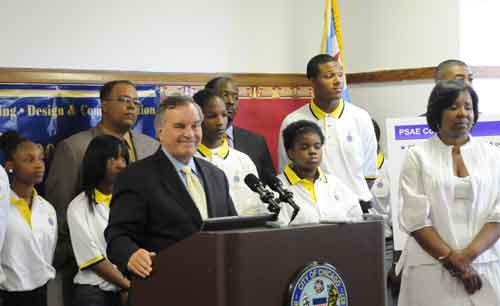 Chicago Mayor Richard M. Daley (above, at podium) smiles while explaining for the 15th year in a row how Chicago's high school test scores had gone 'up' while not having moved proving that his administrative team was successful but that more work needs to be done. Substance photo by George N. Schmidt.Surrounded by a large group of students, Chicago Public Schools administrators, and politicians, Chicago Mayor Richard M. Daley announced on July 27, 2010, that Chicago's high school test scores had gone 'up' for the 15th year in a row. That's the amount of time since Daley was given complete control of the nation's third largest public school system in 1995 with the passage of the so-called "Amendatory Act" and the era of mayor control of large urban public school systems began.
Chicago Mayor Richard M. Daley (above, at podium) smiles while explaining for the 15th year in a row how Chicago's high school test scores had gone 'up' while not having moved proving that his administrative team was successful but that more work needs to be done. Substance photo by George N. Schmidt.Surrounded by a large group of students, Chicago Public Schools administrators, and politicians, Chicago Mayor Richard M. Daley announced on July 27, 2010, that Chicago's high school test scores had gone 'up' for the 15th year in a row. That's the amount of time since Daley was given complete control of the nation's third largest public school system in 1995 with the passage of the so-called "Amendatory Act" and the era of mayor control of large urban public school systems began.
On the Prairie State Achievement Examination (PSAE), Chicago's high school remain at the bottom of the state, and there has been no progress in the general high schools. Even with the data presented in the most unusual format (no data sets were given; only percentages were provided by CPS staff; no questions on the underlying data were taken), it was clear from the information that was in front of reporters that something had gone wrong. Despite all the claims — now national policy — that Chicago's 'model' was a success, Chicago's own numbers, presented in the best light by Chicago school officials, showed the opposite was true. 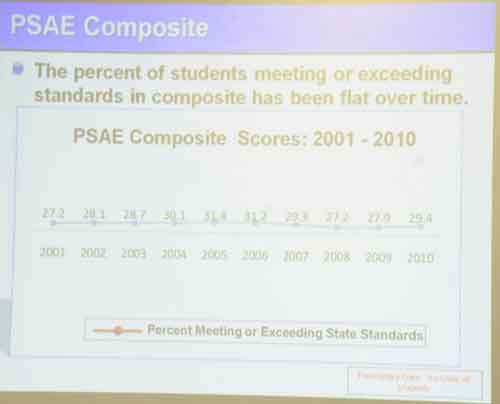 Even though the data in front of them showed that statistically there had been no change in Chicago's high school test scores since the dawn of the 21st Century (when Paul Vallas was 'CEO' of CPS) and that the only supposed gains in test scores from 2001 through 2008 (when Arne Duncan was CEO of CPS) came during an election year when the tests were made easier to make Governor Rod Blagojevich and Mayor Richard M. Daley look better, Chicago school officials and their mayor proclaimed that the flat lining of PSAE test scores for Chicago's high schools proved that the mayor's policies were working. Substance photo by George N. Schmidt.One of the interesting aspects of the July 27, 2010, event was that there was no national media covering the show, despite the fact that the 'Chicago Model' has now become the national model for so-called 'Education Reform' under the administration of President Barack Obama and his U.S. Secretary of Education, former Chicago Schools Chief Executive Officer Arne Duncan.
Even though the data in front of them showed that statistically there had been no change in Chicago's high school test scores since the dawn of the 21st Century (when Paul Vallas was 'CEO' of CPS) and that the only supposed gains in test scores from 2001 through 2008 (when Arne Duncan was CEO of CPS) came during an election year when the tests were made easier to make Governor Rod Blagojevich and Mayor Richard M. Daley look better, Chicago school officials and their mayor proclaimed that the flat lining of PSAE test scores for Chicago's high schools proved that the mayor's policies were working. Substance photo by George N. Schmidt.One of the interesting aspects of the July 27, 2010, event was that there was no national media covering the show, despite the fact that the 'Chicago Model' has now become the national model for so-called 'Education Reform' under the administration of President Barack Obama and his U.S. Secretary of Education, former Chicago Schools Chief Executive Officer Arne Duncan.
Despite the fact that the charts being displayed showing Chicago's high school scores on the Illinois Prairie State Achievement Exams (PSAE) have been flat for most of the 21st Century, Daley, his hand-picked schools Chief Executive Officer Ron Huberman, Chicago Board of Education President Mary Richardson Lowry, and others declared that things were better in the high schools, as measured by standardized test scores, than they had ever been - but that there was still a lot of work to do and the mayor and his team had just the plan to get it done.
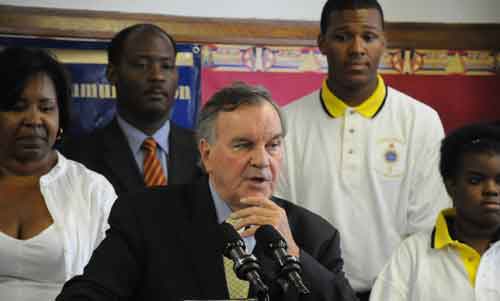 As usual, Daley credited himself with the courage to take over the city's public schools and be "accountable" for public school performance. Substance photo by George N. Schmidt.,At the beginning of the event, Richard M. Daley read carefully from a prepared text outlining what he said were the improvements in the high schools. Daley's Press Secretary, Jacqueline Heard, told this reporter that she would send a copy of Daley's prepared remarks to Substance, but as of dawn on July 28 she had not done so. The remarks cannot be adequately summarized, since they were so carefully crafted, and will be published at the end of this article when finally provided by City Hall.
As usual, Daley credited himself with the courage to take over the city's public schools and be "accountable" for public school performance. Substance photo by George N. Schmidt.,At the beginning of the event, Richard M. Daley read carefully from a prepared text outlining what he said were the improvements in the high schools. Daley's Press Secretary, Jacqueline Heard, told this reporter that she would send a copy of Daley's prepared remarks to Substance, but as of dawn on July 28 she had not done so. The remarks cannot be adequately summarized, since they were so carefully crafted, and will be published at the end of this article when finally provided by City Hall.
Following Daley, Chicago Schools Chief Executive Officer Ron Huberman also read carefully from a prepared test. Huberman's Communications Chief, Monique Bond, like Daley's Press Secretary, Jacqueline Heard, told Substance that she would send a copy of Huberman's prepared remarks to Substance. But as of dawn on July 28 she had not done so. The remarks cannot be adequately summarized, since they were so carefully crafted, and will be published at the end of this article when finally provided by City Hall.
Another person who spoke was Board of Education President Mary Richardson Lowry.
All of the speakers told the press conference that the reasons for the scores was that Mayor Daley had taken over the schools in 1995 and that's why things were better. Daley also repeated his claim that back in 1995 "everybody" said the mayor should not take over the schools, but Daley had the courage to do the hard jobs, and the test scores he was reporting was proof that what began in Chicago in 1995 had worked.
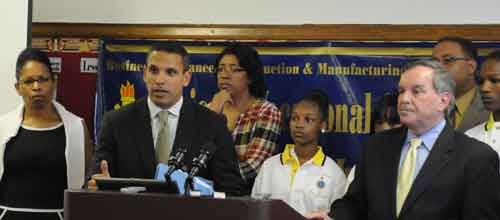 Chicago Schools Chief Executive Officer Ron Huberman reads from his prepared text about the high school test scores. CPS officials told Substance that they would provide Huberman's text (which he read carefully), but as of dawn on July 28 CPS communications chief Monique Bond hadn't sent it. Substance photo by George N. Schmidt. Daley and Huberman also introduced Chicago's high school "Chief Area Officers," the administrators who oversee what in other large cities are the "sub districts" supervised by certified school administrators. Huberman told the group that in 2009, Daley told Huberman that the job description for the "CAOs" should be changed so that the Chicago Board of Education could hire people who were not certified to teacher or administrate in Illinois, and Huberman's administrative team changed the job description. Although the Chicago Public Schools did not release the qualifications of the "Chief Area Officers" (CAOs) that Huberman introduced on July 27, Huberman told the reporters that one of the reasons the test scores were better was that the CAOs had been working on the data under his regime, which practices what Huberman has called "data driven management."
Chicago Schools Chief Executive Officer Ron Huberman reads from his prepared text about the high school test scores. CPS officials told Substance that they would provide Huberman's text (which he read carefully), but as of dawn on July 28 CPS communications chief Monique Bond hadn't sent it. Substance photo by George N. Schmidt. Daley and Huberman also introduced Chicago's high school "Chief Area Officers," the administrators who oversee what in other large cities are the "sub districts" supervised by certified school administrators. Huberman told the group that in 2009, Daley told Huberman that the job description for the "CAOs" should be changed so that the Chicago Board of Education could hire people who were not certified to teacher or administrate in Illinois, and Huberman's administrative team changed the job description. Although the Chicago Public Schools did not release the qualifications of the "Chief Area Officers" (CAOs) that Huberman introduced on July 27, Huberman told the reporters that one of the reasons the test scores were better was that the CAOs had been working on the data under his regime, which practices what Huberman has called "data driven management."
Several reporters (including this reporter) asked how the high schools were going to improve when Huberman was firing hundreds of high school teachers. Huberman said that the top administration (the CAOs) would take care of that through better management.
Huberman refused to answer a question from this reporter asking how many high school teachers had been fired this summer.
One reporter who did not identify herself asked Huberman whether the firings were being done out of seniority order for the first time. Huberman said that they were firing "unsatisfactory" teachers first. Another reporter asked who decided if a teacher were "unsatisfactory," and Huberman said the principals did.
Daley told the press that everyone should lobby the State of Illinois for more money for Chicago. He has been ignoring the fact that since July 2008 he has ordered the Chicago Board of Education, which has the legal power to raise local property taxes by a small amount, not to raise local property taxes. In a July 2008 City Hall press conference (when Arne Duncan was still CEO of CPS), Daley announced that the financial situation of Chicago's public schools was so good that there was no need for a modest raise in local property taxes for the schools. He repeated the same policy (without holding a press conference) in 2009 and 2010, and the school board dutifully failed to raise local property taxes, while clamoring for more money from Springfield, that state capitol.
Chicago Vocational Principal Justin Moore, who has been in office a few weeks, told this reporter that he didn't know how many teachers had been cut from Chicago Vocational since June. When asked whether he would get the information he refused. Like the others present, Moore praised the mayor and Huberman during the event.
As usual, public school officials presented the test score data in the most simplistic manner possible (percentage changes from year to year on various sub-categories). They refused to break out school-by-school results, refused to provide data showing the differences between the general high schools (such as CVS) and the city's magnet and charter high schools, all of which select their students and have the power to eliminate students who threaten to bring "down" their test scores. When graphed in previous years, the data sets show that Chicago has two separate high school systems, a small system (the magnet high schools) where the standard deviation curve is significantly above the median, and a larger system (serving the majority of students) where the "bell" on the curve is significantly below the median.
Generally, when data skew in such a fashion statisticians advise that what is being displayed are two separate and distinct systems. That has been the primary reason why CPS officials and the mayor's office discuss and provide the public with as little data as possible during these annual events, which Substance has covered for decades.
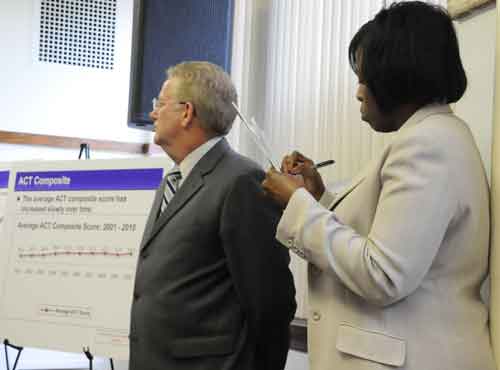 Mayor Daley's Press Secretary Jacqueline Heard (above right, writing) told Substance that she would provide Substance with the complete prepared text from which the mayor read during his remarks. As of dawn on July 28, she had failed to do so. At the June 23 press conference touting the increase in the city's elementary test scores, Heard ended the press conference when Substance reporter John Kugler asked Ron Huberman about the impact of firing teachers and raising class sizes on schools and students. The questions were widely asked at the July 27 event, although Heard continued to discriminate against Substance. Standing with Heard above is CAO Rick Mills, a retired U.S. Army colonel who was hired by former CPS CEO Paul Vallas to oversee the school system's military programs. Mills is now one of six high school "Chief Area Officers." With a change in the regulations governing who can be a CAO, Chicago has now become the first U.S. city where principals (who are required by state law to be licensed, in Illinois with the "Type 75: administrative certificate) are supervised by individuals without Chicago teaching experience or Illinois administrative certification. Substance photo by George N. Schmidt.Now that the Chicago plan and the Chicago model for so-called "school reform" are being exported across the USA, scrutiny of the facts from Chicago, and especially the high school data, will become more and more important. With the appointment of former Chicago CEO Arne Duncan as U.S. Secretary of Education and the implementation of a variation of the Chicago Plan across the USA as federal policy, the claims and data from Chicago become of national importance.
Mayor Daley's Press Secretary Jacqueline Heard (above right, writing) told Substance that she would provide Substance with the complete prepared text from which the mayor read during his remarks. As of dawn on July 28, she had failed to do so. At the June 23 press conference touting the increase in the city's elementary test scores, Heard ended the press conference when Substance reporter John Kugler asked Ron Huberman about the impact of firing teachers and raising class sizes on schools and students. The questions were widely asked at the July 27 event, although Heard continued to discriminate against Substance. Standing with Heard above is CAO Rick Mills, a retired U.S. Army colonel who was hired by former CPS CEO Paul Vallas to oversee the school system's military programs. Mills is now one of six high school "Chief Area Officers." With a change in the regulations governing who can be a CAO, Chicago has now become the first U.S. city where principals (who are required by state law to be licensed, in Illinois with the "Type 75: administrative certificate) are supervised by individuals without Chicago teaching experience or Illinois administrative certification. Substance photo by George N. Schmidt.Now that the Chicago plan and the Chicago model for so-called "school reform" are being exported across the USA, scrutiny of the facts from Chicago, and especially the high school data, will become more and more important. With the appointment of former Chicago CEO Arne Duncan as U.S. Secretary of Education and the implementation of a variation of the Chicago Plan across the USA as federal policy, the claims and data from Chicago become of national importance.
If and when they are made available, Substance will update this article and also publish the complete prepared speeches of Richard M. Daley and Ron Huberman from the July 27 event.
CPS officials provided Substance with the Huberman text on the morning of July 28, 2010, after this story was originally posted, and these additions are being provided on the morning of July 29. Mayor Daley's press office contacted Substance about their promise to provide the mayor's text from July 27, but as of deadline (five a.m.) on July 29, the text of the mayor's statement had still not been provided to Substance.
HUBERMAN'S PREPARED TEXT PROVIDED BY CPS ON JULY 28 BELOW HERE:
Below, as provided by CPS officials, are the prepared remarks that were read during the press conference by Chicago Schools CEO Ron Huberman. According to Monique Bond, CPS communications chief, Huberman may not have read them exactly as they appear below, but our notes reflect that his reading was very close to what appears below:
RH Remarks...PSAE
The charge the Mayor has given us is to push forward …
… away from the status quo …
… to continually raise the bar
…
… and to set goals that challenge our students.
This year’s PSAE results show progress. And, as the Mayor pointed out, progress by any measure is good news.
The composite CPS meets/exceeds score has flat-lined the past couple of years.
So we are encouraged by a 1.5 percentage point gain this year in the composite PSAE scores. Some 29.4 percent of our 11th graders met or exceeded state standards in 2010 testing.
Similarly, we are pleased to report progress in the meet/exceeds percentages in math (up 2.5 percentage points to 29.1 percent) and science (2.9 percentage points to 26.1 percent).
The climb in scores is testimony to hard work at the school level; the heavy lifting that goes on day-in and day-out by dedicated teachers under the leadership of their principals.
Like the Mayor, we are concerned about the marginal decline in reading and we will be taking a close look at that.
In this particular case, the decline follows a year of relatively high growth — 3.9 percentage points — a year ago.
Yet reading is at the core of learning, and to push forward — to make the next leaps in performance so vital for our students — we must address the reading supports and strategies designed to help all students find success.
As this year’s results show a break from the PSAE flat-lining of recent years, the ACT composite similarly shows progress.
A composite score of 17.3 is the District’s highest in a decade.
It is certainly worth noting that in 2001, the CPS composite ACT score was 16.1.
We are pleased that ACT results show the District posted gains in all four ACT subject areas. Increases were seen in English (.6), reading (.2), math (.5) and science (.3).
Of further interest is that the percentage of 11th graders meeting ACT College Readiness Standards increased in all subject areas.
And, that the percentage of CPS students scoring 20 or higher on the ACT composite rose 2.6 percentage points, to 24.4 percent, overall compared to last year.
Over a 10-year period, this percentage has grown by more than 7 percentage points.
We share the Mayor’s sense of urgency in seeing even more progress.
Thank you.

